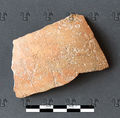EN-1: Difference between revisions
No edit summary |
|||
| Line 23: | Line 23: | ||
Picture in {{bib|Risch 1984}}: 28, Abb 9 (drawing = {{bib|Risch 1989}}: 1586, fig. 7 = {{bib|Schumacher 2004}}: Taf. 5,4). | Picture in {{bib|Risch 1984}}: 28, Abb 9 (drawing = {{bib|Risch 1989}}: 1586, fig. 7 = {{bib|Schumacher 2004}}: Taf. 5,4). | ||
{{bib|Risch 1989}} argues that the potsherd, together with [[index::Ardez| | {{bib|Risch 1989}} argues that the potsherd, together with [[index::Ardez|some more typically Raetic objects with scratchings found at Ardez and Schuls]], belongs in Frizens-Sanzeno-context and should therefore be considered part of the Raetic corpus. {{bib|Pellegrini 1985}}: 98, n. 14 remains sceptical. As, archaeologically, Ardez lies in an area of interference between a number of cultural horizons considered Raetic and/or Celtic, and the two identifiable letters are not decisive palaeographically, an attribution to Raetic is not unassailable. Generally speaking, properly inscribed pottery (as opposed to quasi-script scratchings on Sanzeno bowls and the like) is more typical for the area west of the river Etsch/Adige, usually assigned to the Lepontic (Celtic) corpus. The northernmost Lepontic finds from Graubünden, however, are two gravestones ([http://www.univie.ac.at/lexlep/wiki/GR%C2%B71 GR·1] and [http://www.univie.ac.at/lexlep/wiki/GR%C2%B72 GR·2]). | ||
{{bibliography}} | {{bibliography}} | ||
Revision as of 20:31, 25 February 2014
| Inscription | |
|---|---|
| Transliteration: | aχ[? |
| Original script: | ] |
|
| |
| Object: | EN-1 potsherd (pottery) |
| Position: | outside |
| Script: | North Italic script |
| Direction of writing: | ambiguous |
| Number of letters: | 3 |
| Number of lines: | 1 |
| Craftsmanship: | incised before firing |
| Current condition: | damaged, fragmentary |
| Archaeological culture: | La Tène A, La Tène B [from object] |
| Date of inscription: | first half of the 5th–middle of the 3rd centuries BC [from object] |
| Date derived from: | archaeological context, typology [from object] |
|
| |
| Language: | unknown |
| Meaning: | |
|
| |
| Alternative sigla: | none |
| Sources: | Schumacher 2004: 195, 217 |
Images
|
Object EN-1 potsherd with inscription EN-1.
|
Inscription EN-1.
|
Object EN-1 potsherd with inscription EN-1.
|
Inscription EN-1.
|
Commentary
First published in Risch 1984: 29.
Further references: Risch 1989: 1580.
Picture in Risch 1984: 28, Abb 9 (drawing = Risch 1989: 1586, fig. 7 = Schumacher 2004: Taf. 5,4).
Risch 1989 argues that the potsherd, together with some more typically Raetic objects with scratchings found at Ardez and Schuls, belongs in Frizens-Sanzeno-context and should therefore be considered part of the Raetic corpus. Pellegrini 1985: 98, n. 14 remains sceptical. As, archaeologically, Ardez lies in an area of interference between a number of cultural horizons considered Raetic and/or Celtic, and the two identifiable letters are not decisive palaeographically, an attribution to Raetic is not unassailable. Generally speaking, properly inscribed pottery (as opposed to quasi-script scratchings on Sanzeno bowls and the like) is more typical for the area west of the river Etsch/Adige, usually assigned to the Lepontic (Celtic) corpus. The northernmost Lepontic finds from Graubünden, however, are two gravestones (GR·1 and GR·2).
Bibliography
| LIR | Alberto Mancini, Le Iscrizioni Retiche [= Quaderni del dipartimento di linguistica, Università degli studi di Firenze Studi 8–9], Padova: Unipress 2009–10. (2 volumes) |
|---|



